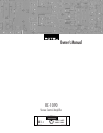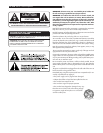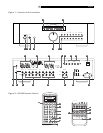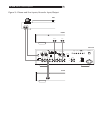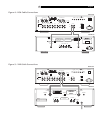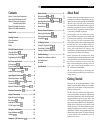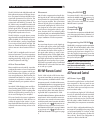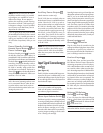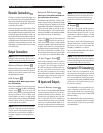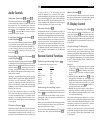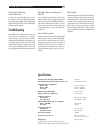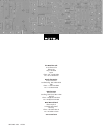
10
RC-1090 Stereo Control Amplifier
Recorder Connections
The Tape 1 and Tape 2 inputs and outputs can
be connected to any record/playback device
that accepts standard line level analog input
and output signals. Typically that will be a con-
ventional tape recorder.
When connecting a recorder to the RC-1090,
remember that the outputs of the recorder must
be connected to the tape inputs of the RC-1090.
Similarly the tape outputs of the RC-1090 must
be connected to the inputs of the recorder. As
with other sources be sure to connect the Left
and Right channels of each device to the proper
channels on the associated components. Use
high quality connecting cables to prevent loss
of sound quality.
Output Connections
NOTE: The RC-1090 has both RCA and
XLR type output connectors. The two sets of
outputs must not be used at the same time.
Balanced Output Switch
When the RCA outputs are used the Balanced
Output switch must be set to the Off position.
Set the switch in the On position when using
the XLR Balanced outputs.
RCA Outputs
[See Figure 4 for RCA output connec-
tion illustration.]
Most power amplifiers have RCA-type input
connectors. With such amplifiers the Balanced
Outputs switch
must be set to the Off
position. Then connect a set of cables between
the outputs of the RC-1090 and the inputs
of the amplifier. As always, use high quality
cables and be sure to connect the Left and Right
channel outputs of the RC-1090 to the cor-
rect channels of the amplifier.
NOTE: There are two sets of RCA outputs
on the RC-1090. The second set of outputs
may be used in custom system configura-
tions to drive a second power amplifier or
to supply a signal to a special signal pro-
cessor.
Balanced XLR Outputs
[See Figure 5 for Balanced XLR out-
put connection illustration.]
The XLR type outputs of the RC-1090 are “bal-
anced” outputs. These provide the advantage
of allowing the power amplifier to be placed
a great distance from the RC-1090 without caus-
ing loss of sound quality or picking up noise
over the long cable run. Of course the associ-
ated power amplifier must have balanced XLR-
type inputs in order to use this feature.
When using the XLR outputs the Balanced
Output switch
must be set to the On po-
sition. Then simply connect a cable with XLR
connectors to the RC-1090 outputs and power
amplifier inputs. Be sure to connect the Left
and Right channel outputs of the RC-1090 to
the correct channels of the amplifier. If you
have questions about the proper type of cable
to use, consult your authorized Rotel dealer.
12 Volt Trigger Outlet
Some audio components can be turned on
automatically when they receive a 12V turn
on “signal”. The 12V Trigger Outputs of
RC-1090 provides the required signal. Con-
nect the compatible components to the
RC-1090 with a conventional 1/8” miniplug
cable. When the RC-1090 is in Standby mode,
the trigger signal is interupted, so the com-
ponents controlled by it are turned off.
IR Inputs and Outputs
External Remote Input
This 3.5 mm mini-jack (labeled EXT REM IN)
receives command codes from an industry-
standard infrared receivers (Xantech, etc.)
located in the main listening room. This fea-
ture is useful when the unit is installed in a
cabinet and the front-panel sensor is blocked.
Consult your authorized Rotel dealer for in-
formation on external receivers and the proper
wiring of a jack to fit the mini-jack receptacle.
NOTE: The IR signals from the EXTERNAL
REMOTE IN jack can be relayed to source
components using external IR emitters or
hardwired connections from the IR OUT
jacks.
IR Output
The IR OUT 1 & 2 jacks send IR signals re-
ceived at the EXTERNAL REM IN jack to an
infrared emitter placed in front of a source
component or to Rotel CD players, cassette
decks, or tuners with a compatible rear panel
IR connector.
This output is used to allow IR signals to pass
along IR signals from a remote control when
the sensors on the source components are
blocked by installation in a cabinet.
See your authorized Rotel dealer for informa-
tion on IR repeater systems.
NOTE: The EXT REM IN jack located next
to the these jacks is for use with an external
IR sensor duplicating the front panel IR sen-
sor and located in the primary zone.
Computer I/O Connector
The RC-1090 can be operated from a per-
sonal computer running audio system control
software from third-party developers. This con-
trol is accomplished by sending the operat-
ing codes normally sent by the RR-969 remote
control over a hard-wired network connec-
tion from the computer.
The COMPUTER I/O input provides the nec-
essary connection on the back panel. It ac-
cepts standard RJ-45 8-pin modular plugs,
such as those commonly used in 10-BaseT UTP
Ethernet cabling.
For additional information on the connections,
software, and operating codes for computer
control of the RC-1090, contact your autho-
rized Rotel dealer.



